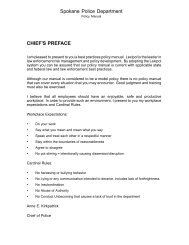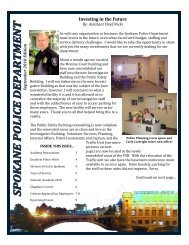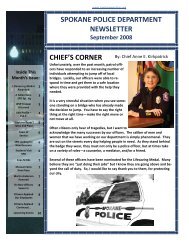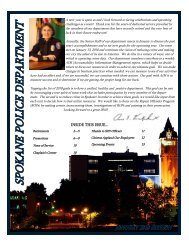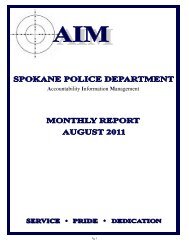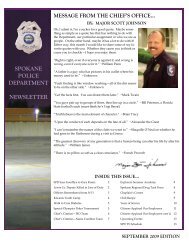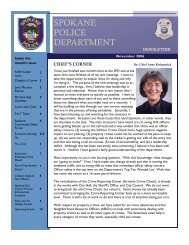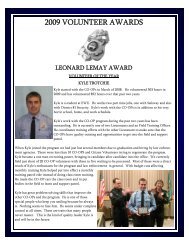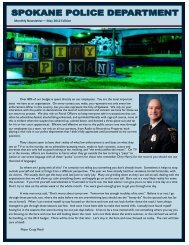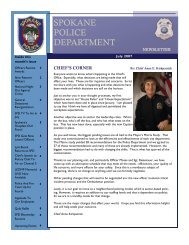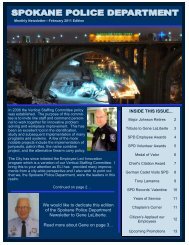DRAFT REPORT OF THE CITY OF SPOKANE USE ... - Samuel Walker
DRAFT REPORT OF THE CITY OF SPOKANE USE ... - Samuel Walker
DRAFT REPORT OF THE CITY OF SPOKANE USE ... - Samuel Walker
You also want an ePaper? Increase the reach of your titles
YUMPU automatically turns print PDFs into web optimized ePapers that Google loves.
City of Spokane Use of Force Commission December 20, 2012<br />
Recommendation #12 – Establish a continuing Crisis Intervention Training<br />
program and adopt protocols for the deployment of CIT officers.<br />
Individuals who suffer from mental illness or who are under the influence of drugs or<br />
alcohol are relatively more vulnerable to the use of force by police officers due to the<br />
volatility of the encounters between those citizens and the police. In the absence of<br />
practices and strategies to de-escalate and control these encounters, they can escalate<br />
quickly to the detriment of the safety of both the citizen and the officers involved. In<br />
recognition of this reality, the law requires that police practices extend special<br />
consideration to individuals in mental health crisis. See Bryan v. MacPherson, 630 F.3d<br />
805, 829 (9 th Cir. 2010) (“The government has an important interest in providing<br />
assistance to a person in need of psychiatric care; thus, the use of force that may be<br />
justified by that interest necessarily differs both in degree and in kind from the use of<br />
force that would be justified against a person who has committed a crime or who poses<br />
a threat to the community.”); Deorle v. Rutherford, 272 F.3d 1272, 1282 (9 th Cir. 2001)<br />
(officers must take into account the subject’s mental and emotional state before using<br />
force).<br />
The Commission endorses that part of the Otto Zehm civil suit settlement that commits<br />
to all SPD officers undergoing Crisis Intervention Training (CIT). Such training for the<br />
officers, to include the department’s leadership, will increase public safety by providing<br />
SPD members with a better understanding of the conditions that often engender<br />
behavior which can be perceived as threatening and by providing officers with tactics to<br />
defuse or control such situations without having to resort to dangerous levels of force.<br />
In order for a CIT program to have long-lasting positive effects on public safety, the<br />
program must ensure that SPD officers receive refresher CIT at appropriate intervals<br />
and that all officers coming into the department, whether as an entry level or lateral hire,<br />
receive CIT in close proximity to the start of their employment. Additionally, to promote<br />
a department-wide commitment to the CIT program, SPD leadership should market the<br />
value of the training within and outside the department (e.g., promote officer<br />
testimonials on how the application of CIT makes them more effective in their work,<br />
invite the media to attend training, etc.).<br />
One component of an effective CIT program that deserves particular attention is the<br />
subject of Excited Delirium. Excited Delirium is a life-threatening medical emergency,<br />
typically in the context of stimulant drug abuse (e.g., cocaine, PCP, methamphetamine,<br />
etc.), characterized by an individual evidencing agitation, excitability, confusion,<br />
paranoia, and bizarre behavior. Officers are frequently called upon to make<br />
instantaneous decisions with regard to both recognizing the condition and in containing<br />
the chaos and danger its occurrence creates for the citizen and others. A coordinated<br />
response with paramedics and a “contain rather than restrain” approach with sufficient<br />
officer assistance is often imperative to prevent sudden death. Excited Delirium<br />
training, in the context of a CIT program, should, at a minimum, include instruction on:<br />
the signs and symptoms of the condition; the imperative to call for emergency medical<br />
assistance as soon as possible; the need to contain, if possible, rather than restrain an<br />
City of Spokane Use of Force Commission – Page 17



